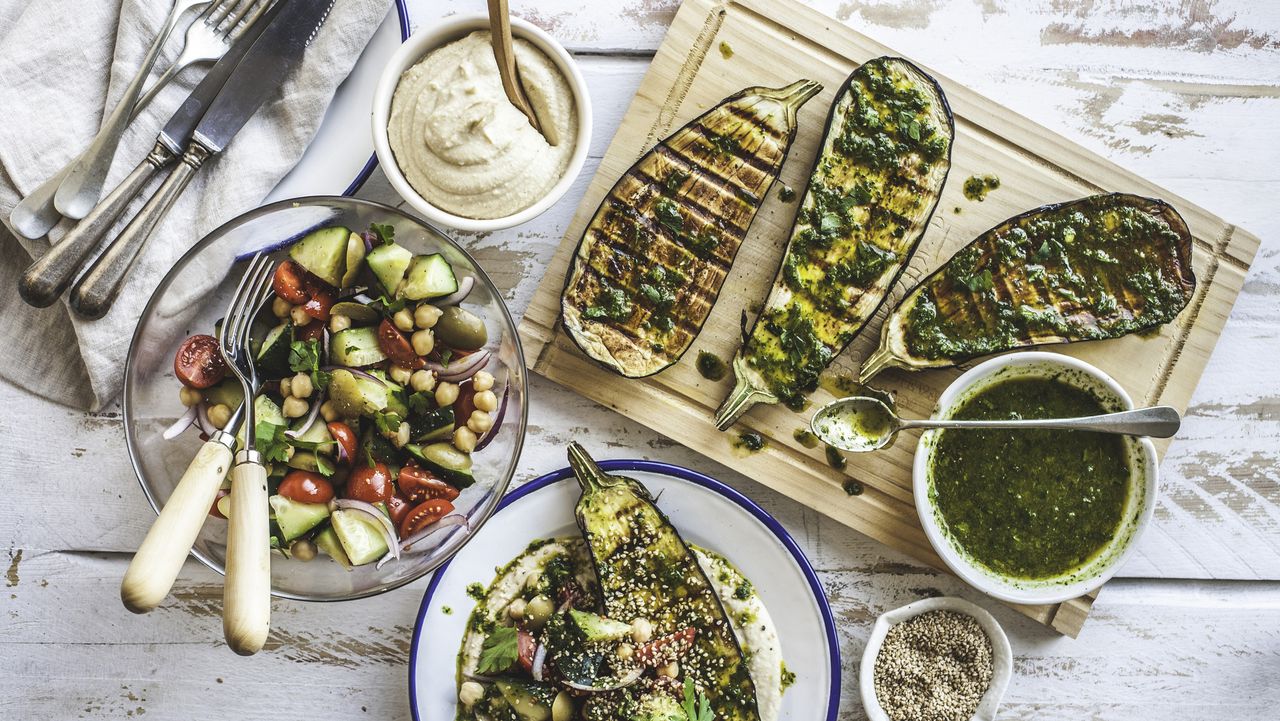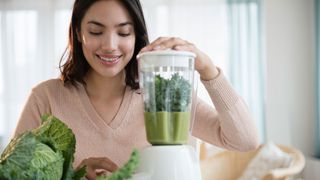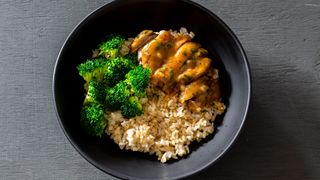9 essential nutrients you’re probably not eating enough of - including copper
Find out the nutrients you might be lacking and how to work them into your diet

When it comes to the question of how to eat healthily, you probably know that you need vitamins such as vitamin D, iron and calcium. But did you know you should also be eating copper? And iodine? And zinc?
According to dietician Laura Clark, ‘lesser-known but vital nutrients can easily fall by the wayside, whether it’s from eating processed food, little dietary variety or cutting out food groups’.
- Best vitamins for women over 50: what to look for — and avoid
- How to eat healthily on a budget
- How to lower blood sugar levels
‘I ask clients to keep a food diary for a week to look at overall variety and vitamin and mineral intake,’ adds fellow dietician Lucy Jones. ‘You can see the areas they are neglecting and remedy them with, say, some Brazil nuts a few times a week to top up on selenium, or seafood to boost iodine intake.’
Multivitamins aren’t always the answer. ‘We still don’t know the full story of how nutrients interact,’ says Lucy, ‘so lumping them together may not be best for absorption. Supplements have their place, such as during pregnancy, but otherwise, your best bet is a balanced diet full of fresh food.’
If you think you have a severe nutritional deficiency, you should see your doctor. Also be aware that excessive amounts of vitamins or minerals can lead to serious health problems too - so don't go crazy, but do make sure you're getting enough of the nine following nutrients...
1. Zinc
‘Zinc is essential for a healthy immune system,’ says Laura. It should be eaten daily because the body doesn’t store it, and extra can be useful when you’re ill – in a 2017 study, zinc lozenges reduced the duration of a cold by three days.
How to eat more zinc
Oysters are full of zinc, but a daily dose might bankrupt you. Zinc is also found in:
Get the Fit&Well Newsletter
Start your week with achievable workout ideas, health tips and wellbeing advice in your inbox.
- Other shellfish
- Seeds
- Dairy
- Eggs
- Nuts
- Beef
2. Magnesium
Magnesium helps to regulate blood pressure and maintain brain function. ‘A recent study showed that all age groups apart from under-11s don’t have a sufficient daily intake,’ says Lucy. ‘High-protein diets such as paleo, or too much fat or alcohol can inhibit absorption.’
How to eat more magnesium
Good sources of magnesium include:
- Tofu
- Soya beans
- Seeds
- Almonds, cashews, walnuts and peanuts
- Green leafy veg
- Okra
- Dark chocolate
Note that tea and coffee may reduce absorption, so leave that cup until at least an hour after meals.

Try a leafy green smoothie to up your magnesium intake
- Best blenders: top smoothie makers and food processors for a healthy diet
3. Potassium
If you’re a fan of processed foods, you could be depriving yourself of this nutrient, and studies show that a quarter of women don’t eat enough. ‘Processed foods lack potassium and are high in sodium,’ says Charlotte Turner, founder of The Health Nutritionist. ‘Potassium offsets sodium’s negative effects. It’s needed to regulate blood pressure, and for nerve and muscle strength.’
How to eat more potassium
Good sources of potassium include:
- Avocados
- Spinach
- Apricots
- Sweet potatoes
- Squash
- Baked beans
- Nuts
- Bananas
4. Folate
You’ll have heard of folic acid (the synthetic form of folate) supplements for pregnancy. ‘But folate is essential for women of all ages, pregnant or not,’ says Charlotte. ‘It partners with vitamin B12 to make red blood cells and help nerves to function properly.’
How to eat more folate
Leafy greens such as spinach, kale and broccoli are a great source, but know that folate leaches out when boiled, so steam or microwave instead.
Folate is also found in:
- Beans
- Peas
- Oranges
- Strawberries
- Shellfish
- Poultry
- Pork
- Fortified cereals
5. Choline
‘Like folate, choline is key to the prevention of neural tube defects in pregnancy,’ says Lucy. ‘Deficiency also causes kidney and liver problems in adults. As well as people with low intake, we see this when people drink too much alcohol, which leaches water-soluble nutrients like choline from the body.’
How to eat more choline
Egg yolks are the richest source of choline. Others include:
- Milk
- Almonds
- Brown rice
- Broccoli
- Cauliflower
- Soya products
- Green leafy veg such as spinach

Try a chicken, broccoli and brown rice stir-fry to get a double dose of choline
6. Copper
Did you know that you need to eat copper? On average, women between 19 and 64 eat less than the recommended intake. It’s involved in the production of haemoglobin, the substance in red blood cells that carries oxygen around the body.
What’s more, a recent study at the University of Berkeley found that copper and a 2016 study found that copper is essential for burning fat.
How to eat more copper
Good sources of copper include:
- Shellfish
- Leafy greens
- Seeds
- Nuts
- Shiitake mushrooms
- Lentils and beans
7. Selenium
Over half of us don’t eat enough selenium. ‘It’s an antioxidant, and protects cells from damage,’ says Laura. ‘It also works with iodine to produce the right levels of thyroid hormone and is key to immune function.’
How to eat more selenium
Brazil nuts are particularly rich in selenium, and it’s also found in:
- Poultry
- Fish
- Eggs
8. Iodine
The American Thyroid Association warns that around 30% of the world’s population is at risk of iodine deficiency, and the UK is globally the seventh most iodine-deficient country - one of only two high-income nations in the top 10.
Low levels can affect production of thyroid hormones, which control metabolism. ‘It’s vital for developing brains,’ says Lucy. ‘Pregnant or breastfeeding women need enough.’
How to eat more iodine
- The richest source is seafood
- Dairy, turkey and eggs also have some
- Seaweed is a good vegan source, although pregnant women should eat no more than one portion weekly
9. Vitamin B12
Dairy products and meat are the main ways we get B12 through diet. ‘So, if you’re veggie or vegan, or just don’t eat a lot of those foods, you’re at risk of deficiency,’ says Charlotte.
‘A lack of B12 causes the body to produce abnormally large red blood cells, which can’t function properly. B12 also keeps the brain and nervous system healthy.’
How to eat more vitamin B12
Vegetarian sources include:
- Marmite
- Fortified cereals
- Fortified oat, rice and almond milks
A one-day diet plan featuring all these nutrients
Here, Charlotte suggests a sample one-day menu that includes all these nutrients, along with other essentials. ‘You can see that a nutritionally complete diet is all about cramming veg and fruit in wherever you can, along with a healthy balance of protein and wholegrain carbs,’ she says.
Breakfast
Poached eggs on wholegrain bread with some wilted spinach and spring onions. Freshly squeezed orange juice.
Lunch
Chargrilled turkey breast (or lentil, feta and bean) quinoa salad with spinach, rocket, avocado and asparagus.
Mid-afternoon snack
Handful of Brazil nuts and two squares of dark chocolate.
Dinner
Soy-glazed salmon with sesame seeds, broccoli, shiitake mushrooms and rice. Fortified granola berry crumble with natural yogurt.
Launched in 2020, Fit&Well.com is all about helping you meet your health and fitness goals in ways that are fun and achievable. With news and features on fitness, weight loss, running, nutrition, yoga, wellness and more, we're committed to helping you wherever you are on your fitness journey. We break down the best fitness tech, with reviews, buying guides and the latest deals on fitness and wellness kit, from dumbbells to diffusers.
We cater for all difficulty levels here. It doesn't matter if you're a beginner in the world of fitness or you're gearing up for your tenth marathon: we're all moving towards the same goal – creating a healthier, happier you. From guides on getting started doing walks around the block, to creating the perfect work-from-home space, to eating to fuel your first triathlon. It's all here.
-
 I'm a personal trainer and this is the six-move full-body workout I rely on when all I have is a pair of dumbbells
I'm a personal trainer and this is the six-move full-body workout I rely on when all I have is a pair of dumbbellsWorkout A comprehensive circuit to build lower body, upper body and core strength
By Sam Rider Published
-
 A barre instructor says this five-minute no-equipment routine will give you an energy boost—I put it to the test
A barre instructor says this five-minute no-equipment routine will give you an energy boost—I put it to the testFive-minute workouts Take a break from your desk and try this workout
By Alice Porter Published

